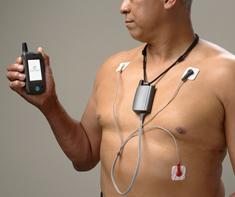
Cardionet MCOT allows you to monitor your heart in realtime, which can be of major benefit for those prone to heart attacks and disease. The device, which consists of a few sensors and a monitor, has been on the market for several years but continues to struggle. The company behind the technology, also Cardionet, has seen its share prices fall to record lows. According to press releases from the company, mediocre sales can be linked to low reimbursements by major insurance carriers like United Healthcare and Wellpoint. The company was also dealing with a securities class action litigation. Yet these problems pale in comparison to a larger strategic mistake: the company needs to stop worrying about improving their business and start worrying about improving their technology. Cardionet MCOT needs to be adapted and made cheaper or it won’t be able to compete.
As we mentioned when we first discussed the technology last year, the Cardionet MCOT system requires patients not just to have a device, but monitoring services as well. Essentially your heart information is recording on a handheld and periodically uploaded to your provider. Serious conditions can be spotted ahead of time, and dangerous conditions can raise alerts in realtime. See the video below for more details. It’s a great idea, and one that could save thousands of lives. We’ve seen an enhanced version of the concept in the form of an implant, and a milder version in the form of fitness sensors. Clearly heart monitoring is a technology people are ready to invest in, the question is, what form should it take.
Current reimbursements for Cardionet MCOT range from around $750 to $1250 (assumably per year). According to MobiHealthNews, at the $750 level Cardionet finds their business model untenable. That seems incredibly lame. Toumaz and WIN have both created wearable health data networking devices that are so cheap they are disposable. We’re seeing new health monitoring smart phone applications (like those from AirStrip) that while far from free are relatively cheap ways to tie in medical professionals with (sometimes realtime) patient data. I find it hard to believe that a ECG device can’t be created and monitored at a price where $750 in reimbursement wouldn’t lead to a profit.
Clearly it’s difficult to deal with the shifting whims of the insurance industry. But Cardionet MCOT was approved back in 2002. The company has had a winning idea for eight years and is still failing to grow as it should. Make Cardionet smaller and easier, model it after the disposable patches or home health monitoring systems. Incorporate the use of smart phones or other well tested mobile tech. Leverage artificial intelligence systems to save you labor costs on the monitoring side. Whatever it takes, find the right form for the technology and the idea will prosper no matter what the insurance situation. In fact, screw insurance. Make the system cheap enough, simple enough, and light enough and you’ll have people buying the monitor on their own.
Heart disease is one of the biggest killers in the US and the world. Mobile realtime ECG is a winning concept. If you can’t make it work, you’re doing something wrong.
[image and video credits: Cardionet]
[source: Cardionet]


